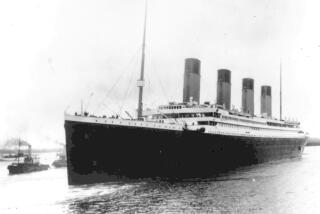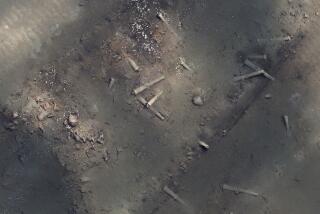Titanic’s ‘hallowed ground’ and artifacts may get new protections
- Share via
WASHINGTON -- On the 100th anniversary of the sinking of the Titanic, lawmakers are moving to further protect the shipwreck site.
The R.M.S. Titanic Maritime Memorial Preservation Act would impose penalties of up to $250,000 a day and five years in prison on any American or U.S. vessel that disturbs the wreckage without permission or brings illegally recovered artifacts into the country.
“It’s important to remember that this site on the floor of the Atlantic is a place where so many went to their deaths,’’ Sen. John Kerry (D-Mass.), the bill’s sponsor, said in a statement. It is, he added, “hallowed ground, not just some underwater area to be poked at or damaged for commercial reasons.”
The Titanic, the wreck of which was found in 1985, sank off Newfoundland on its maiden voyage from Britain to New York in April 1912 after hitting an iceberg, killing more than 1,500 passengers and crew.
It lies in international waters, but the legislation seeks to thwart “looting and unscientific salvage’’ of Titanic artifacts -- even by foreigners -- by establishing penalties for bringing them into the United States and by subjecting them to seizure by the government.
Congress has addressed the Titanic disaster before, including holding hearings in 1912 and passing a bill in 1986, shortly after the Titanic was found. That measure, signed by President Reagan, called for negotiating an international agreement that would designate the ship wreckage an “international maritime memorial’’ and the writing of rules for conducting research, exploration and salvage.
Marc-Andre Bernier, chairman of the Advisory Council on Underwater Archaeology, said in an email to The Times that the legislation is important “from the archaeological and historical perspective, and even more so from the solely global perspective aiming for the respect and protection of the resting place of more than a 1,000 souls.”
“It would also send a very strong signal to the importance of protecting not only Titanic, but all of our submerged cultural heritage, historical and archaeological treasures belonging to everyone,” he said.
The proposed legislation does not prohibit exploration or salvage -- indeed thousands of artifacts have been recovered -- but subjects activities near the wreckage to the rules established by the international agreement.
The bill, co-sponsored by Sen. Johnny Isakson (R-Ga.), would give the National Oceanic and Atmospheric Administration authority to enforce the rules governing exploration and salvage. It also would establish the Titanic Advisory Council to make recommendation on “preservation of R.M.S. Titanic property and conservation and curation of artifacts recovered from the R.M.S. Titanic.’’
Joe Luppino-Esposito, visiting legal fellow at the Heritage Foundation’s Center for Legal and Judicial Studies, wrote on the conservative think tank’s blog, The Foundry: “If this bill is what members of Congress think is important, then I fear they are rearranging deck chairs on, well, you get the idea.’’
ALSO:
Delivering the space shuttles is tougher than you think
Trayvon Martin case: Trial is challenge for prosecution, defense
Titanic: Who was -- or wasn’t -- on board? Finally, it’s easy to find out
More to Read
Sign up for Essential California
The most important California stories and recommendations in your inbox every morning.
You may occasionally receive promotional content from the Los Angeles Times.











